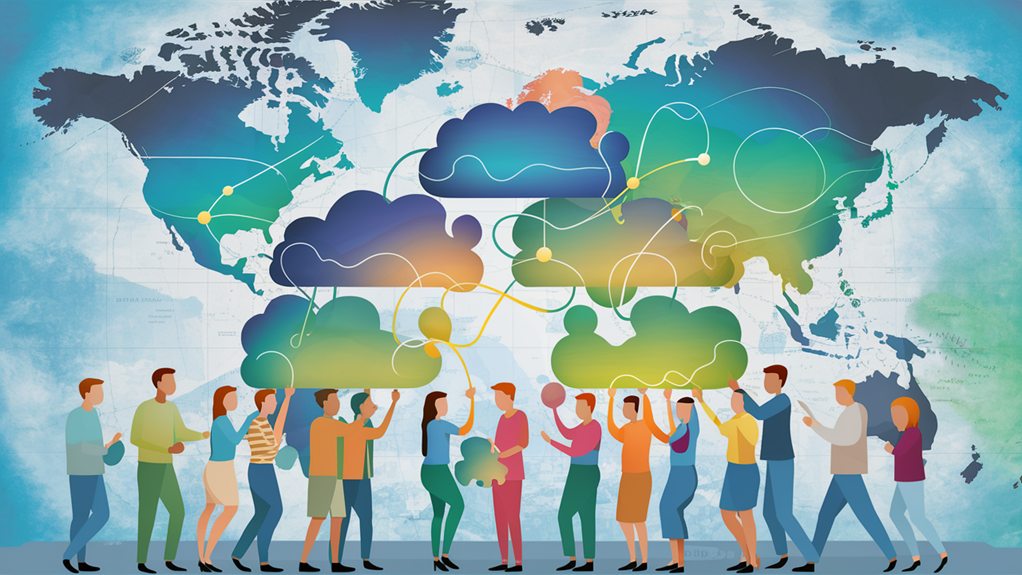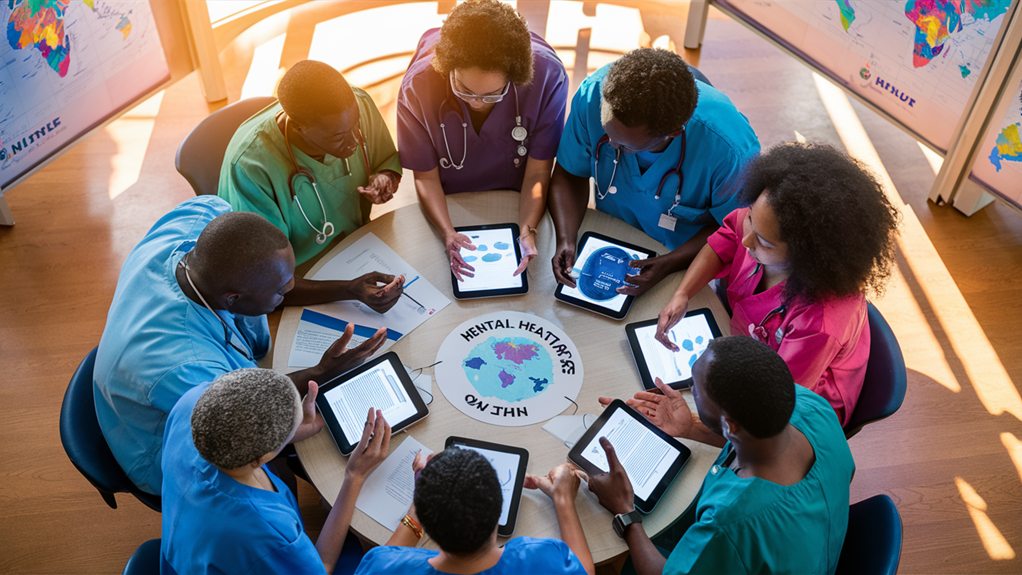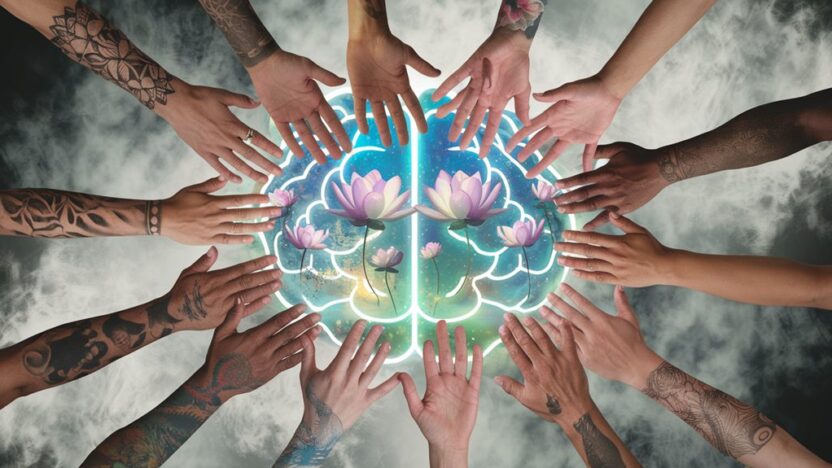Global mental health initiatives are transforming how you can access and receive mental health care worldwide. These programs combine traditional healthcare with modern technology, like telehealth services and mental health apps, to reach more people in need. You'll find grassroots organizations working alongside international partnerships to break down stigma, provide education, and deliver essential services to communities. Through sustainable development practices, these initiatives create lasting change by training local healthcare workers, establishing support groups, and building green spaces for well-being. There's a wealth of innovative solutions emerging that show how mental health care is becoming more accessible, culturally sensitive, and effective.
Current Global Mental Health Landscape

The global mental health landscape presents a stark contrast between developed and developing nations. You'll find that while some countries have extensive mental health programs and resources, others struggle to provide even basic mental health services to their populations.
When you look at global mental health programs worldwide, you'll notice that access to care varies dramatically based on location, economic status, and available infrastructure. Neuroscience research has shown that understanding how brain function influences mental health conditions can aid in developing more effective treatment strategies, particularly in regions with limited resources the connection between neuroscience and mental health.
International mental health awareness has grown considerably in recent years, and you're now seeing more collaborative efforts between countries to address these disparities. Global mental health organizations, like WHO and various NGOs, are working to bridge these gaps by implementing training programs, providing resources, and establishing support networks in underserved regions.
You'll discover that cultural differences, stigma, and limited funding continue to pose considerable challenges in many areas. However, there's encouraging progress in technology-based solutions, where telehealth services and mobile apps are making mental health support more accessible.
When you examine the data, you'll see that while we're making strides in improving mental health care globally, there's still much work to be done to guarantee equitable access for all.
Breaking Mental Health Stigma
Through mental health advocacy, you can help create positive change in your community. When you share accurate information about mental health conditions, support others who speak up, and challenge misconceptions, you're contributing to a more understanding society.
Educational initiatives are essential in this effort, as they help dispel myths and provide valuable insights into mental health challenges Breaking the Silence. You'll notice that more people are starting to view mental health challenges the same way they view physical health issues, which is exactly what's needed.
You can break down stigma by using respectful language, sharing personal experiences when you feel comfortable, and encouraging open conversations about mental health.
Instead of saying someone is "crazy" or "unstable," you'll want to use person-first language that doesn't define people by their conditions. Remember, every time you speak up against stigma, you're helping create a world where people feel safe seeking the help they need.
Grassroots Programs Making Impact

Community-led mental health programs are proving to be powerful catalysts for change worldwide, reflecting the importance of cultural factors in mental health that shape how care is perceived and delivered.
You'll find these initiatives taking root in neighborhoods, schools, and community centers, where local leaders are stepping up to address mental health needs in culturally relevant ways.
In places like Uganda, you'll see peer support groups meeting under trees, where trained community members help their neighbors work through anxiety and depression.
Meanwhile, in Brazil's favelas, youth mentorship programs are teaching teens to recognize mental health challenges and support their friends through difficult times.
You're witnessing a remarkable shift as these grassroots efforts connect people with resources they wouldn't otherwise have.
Local volunteers are learning basic counseling skills, organizing awareness walks, and creating safe spaces for people to share their stories.
Through social media and mobile apps, they're reaching even more community members who need support.
What's particularly exciting is how these programs are adapting to fit local needs.
Whether it's through art therapy sessions in India's rural villages or support groups for new mothers in Thailand, you're seeing communities take ownership of their mental well-being.
Technology and Mental Healthcare Access
Across digital platforms, innovative technologies are revolutionizing mental healthcare accessibility worldwide. You'll find that telehealth services now connect you directly to mental health professionals through your smartphone or computer, making therapy sessions possible from anywhere with an internet connection.
Additionally, various mental health apps are designed to help manage anxiety effectively, offering features like guided meditation and stress-relief games that can be tailored to your needs vital digital tools. Mental health apps have become your digital companions, offering everything from guided meditation to mood tracking and cognitive behavioral therapy exercises. You're able to access these tools 24/7, which is particularly helpful when you're dealing with anxiety or depression during off-hours.
Virtual reality systems are even helping you confront phobias and practice stress management in safe, controlled environments.
You'll notice that artificial intelligence is changing how you receive initial mental health assessments, as chatbots can now screen your symptoms and direct you to appropriate resources. In remote areas, where you mightn't have easy access to mental health professionals, these digital solutions are bridging significant gaps.
Through secure messaging platforms, you're able to maintain ongoing communication with your therapist, ensuring that support is always just a few clicks away.
Training Healthcare Workers Worldwide

Mental health training programs are rapidly expanding to equip healthcare workers in both urban and rural settings with essential skills. These initiatives are vital because mental disorders, such as depression and anxiety, can have debilitating effects on individuals and communities symptoms and treatments.
You'll find that organizations worldwide are creating extensive courses that help doctors, nurses, and community health workers better understand and treat mental health conditions. These programs, which often combine online learning with hands-on practice, are making a real difference in communities that have limited access to mental health specialists.
To strengthen global mental health care, training programs focus on three key areas:
- Basic mental health assessment skills, including how to identify common conditions like depression, anxiety, and post-traumatic stress disorder
- Cultural competency training that helps healthcare workers understand local beliefs, traditions, and approaches to mental health
- Crisis intervention techniques that prepare workers to handle emergency situations and provide immediate support
You'll notice that these training initiatives aren't just about teaching clinical skills – they're about building confidence and competence in healthcare workers who'll become their community's front-line mental health supporters.
Sustainable Development and Mental Health
How does sustainable development intersect with global mental health? The connection's stronger than you might think, as mental well-being and sustainable communities go hand in hand. When communities have stable resources, clean environments, and economic opportunities, they're better equipped to support their residents' mental health needs.
You'll find that sustainable development creates the foundation for better mental healthcare through several key channels. First, it guarantees consistent funding for mental health programs, making them more reliable and accessible to those who need them.
Second, it promotes education and awareness about mental health issues, reducing stigma in communities worldwide.
Third, it helps create green spaces and recreational areas that have been proven to boost mental well-being.
You can see these principles at work in successful programs around the world, where sustainable development has led to improved mental health outcomes. For instance, communities that invest in renewable energy often use the cost savings to fund mental health services.
When you consider that poverty and environmental stress directly impact mental health, it's clear that sustainable development isn't just good for the planet – it's essential for our collective well-being.



